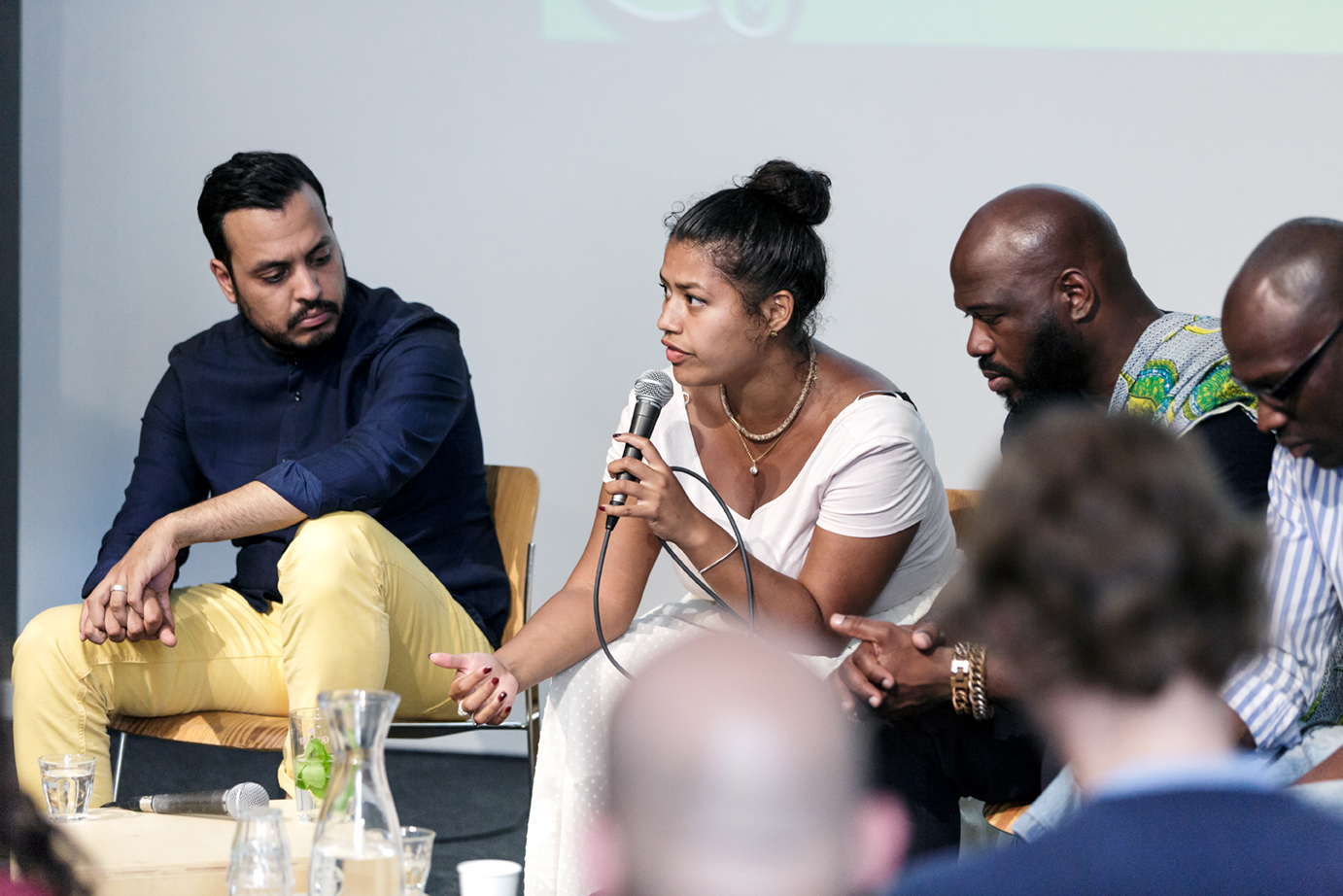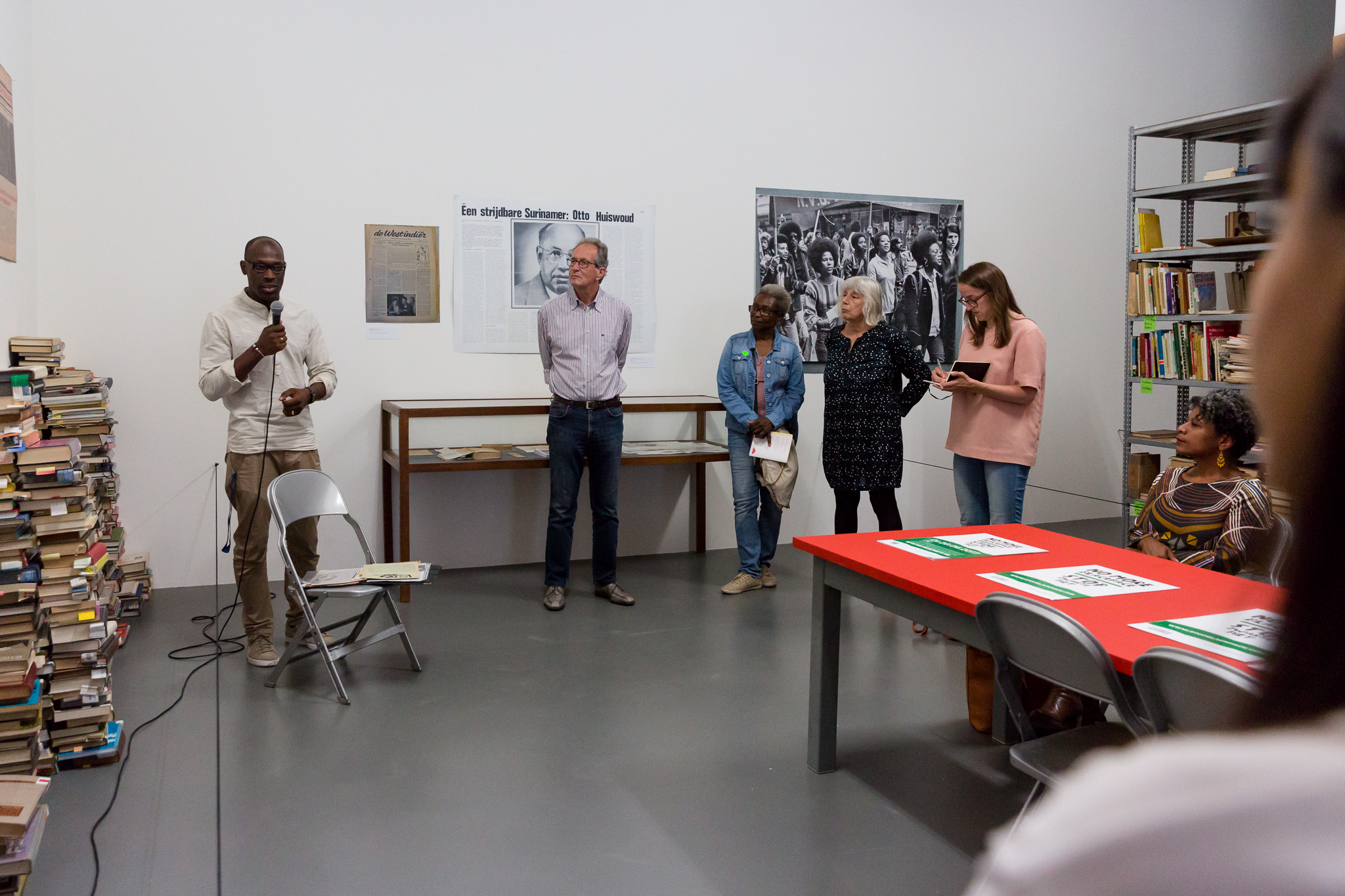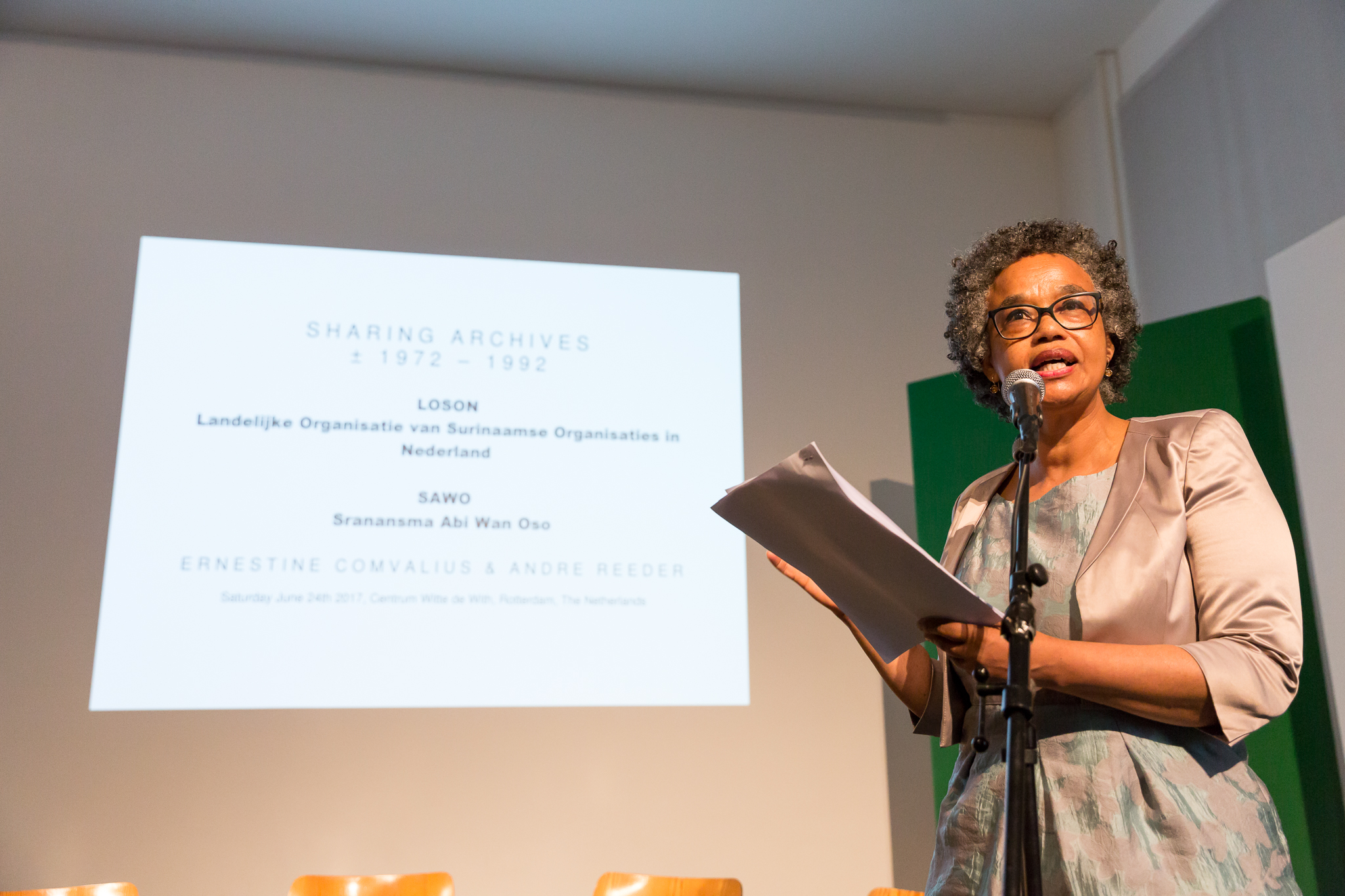Cinema Olanda: Platform [2017]
exhibition and events platform
Witte de With Center for Contemporary Art Rotterdam
two months
with:
Gerbrig Klos
Nourdin el Ouali
Malique Mohamud
Ka’at Santos
Caitlin Schaap
Elvin Ritgers
New Urban Collective
Andre Reeder
Ernestine Comvalius
Nona Nahumury
Kehinde Andrews
other events
Roet in het Eten - Quinsy Gario ︎
Black Figures, Black Voices - ASCA ︎
Decolonial Options - First Things First ︎
Holland my Mars - Charl Landvreugd ︎
back to Cinema Olanda Platform ︎
exhibition and events platform
Witte de With Center for Contemporary Art Rotterdam
two months
with:
Gerbrig Klos
Nourdin el Ouali
Malique Mohamud
Ka’at Santos
Caitlin Schaap
Elvin Ritgers
New Urban Collective
Andre Reeder
Ernestine Comvalius
Nona Nahumury
Kehinde Andrews
other events
Roet in het Eten - Quinsy Gario ︎
Black Figures, Black Voices - ASCA ︎
Decolonial Options - First Things First ︎
Holland my Mars - Charl Landvreugd ︎
back to Cinema Olanda Platform ︎
The Black Archives on Tour - New Urban Collective
A week of talks, screenings and dialogues programmed by New Urban Collective (Jessica de Abreu, Mitchell Esajas) including a session on the ‘Zwarte Piet’ issue, and hidden histories of black resistance and radical black intellectuals with a talk by Dr Kehinde Andrews (Associate Professor in Sociology, Birmingham University), and exploration of Surinamese black emancipation movements such as LOSON/SAWO by Andre Reeder (Film Maker) and Ernestine Comvalius (Director, Bijlmerparktheater and Theater Crater). A live archiving of a major new acquisition will be included in the exhibition. Events:
No More Blackface: #ZWARTEPIETKENNIET
Recent years have seen a new wave in the antiracism movement, in which Zwarte Piet is seen as a product of the "actively forgotten" colonial and slavery past, but is also a symbol of underlying institutional racism, discrimination, and inequality in contemporary society. Activism against Zwarte Piet has touched a sensitive spot for the nation and unloosed intense public discussion. Through demonstrations, sharply-divided public opinion, public debates, petitions, litigation, and more, it seems the tradition is slowly changing.
While in the capital the choice has been made to say goodbye to the racist caricature, it is still evident in Rotterdam. In November 2016, 200 civilians were arrested whilst peacefully protesting against the tradition. Amnesty International called the mayors’ ban on demonstrations that day a violation. How has it come about that there is a greater intensity of activism against Zwarte Piet and racism in Amsterdam, compared to Rotterdam? How can cooperation between activists and communities in different cities be promoted, and how can activists, politicians, lawyers, artists and people from other disciplines in Rotterdam organize against Zwarte Piet?
youtube link ︎
![]()
![]()
![]()
![]()
Photographs by Aad Hoogendoorn
LOSON: The Hidden Story of Radical Surinamese Movements in the 1970s and 80s
Did you know that in the 1970s, in cities such as Amsterdam and Rotterdam, an (informal) ‘spreidingsbeleid’ or ‘spreading policy’ was active that excluded Surinamese from certain neighbourhoods? Did you know that there was an (informal) policy in Amsterdam that only one Surinamese, Turkish or Moroccan family could inhabit a flat per apartment block? Did you know that there were radical Surinamese emancipation movements active in the 1970s and 1980s that organized against racism and inequality and, among other things, squatted a flat in the Bijlmer? Chances are you did not, because these stories and histories have long been hidden. The New Urban Collective has found books and documents in the Black Archives that reveal these hidden stories of black emancipation movements spearheaded by organisations such as the National Organisation of Surinamese in the Netherlands (LOSON) and Surinamese Laborers and Workers Organization (SAWO).
Andre Reeder (Film Maker) and Ernestine Comvalius (Director, Bijlmerparktheater and Theater Crater) were active in LOSON in the 1970s and 1980s, a national action group of the Surinamese community in Amsterdam, Rotterdam, The Hague and Utrecht. Andre Reeder’s film Onderneming Onderdak (1973) documents the terrible living conditions of many immigrants from Suriname and the former Antilles that resulted from the ‘spreading’ policies. After the screening of the film, Reeder and Comvalius shared stories about their times as activists at the LOSON / SAWO. The New Urban Collective invited previous members of these organisations to attend the event and contribute their memories to the discussion.
youtube link ︎
![]()
![]()
![]()
![]()
Photographs by Aad Hoogendoorn
Black Archives, Black Radicalism Session
The current movements against Zwarte Piet and racism has been called “the second wave of anti-racism”. The first was provoked by organisations in the 70s and 80s, such as LOSON and SAWO. However, in the Black Archives an “actively forgotten” history of radical black activists who organized in the 50s and 60s has been recently discovered. The story of Otto and Hermie Huiswoud, in particular, stands out as a hidden history of the fight against racism and colonialism in Europe. The Huiswouds were part of an international network of black radicals who emerged during the Harlem Renaissance, and organized based on Marxist and pan-African critiques. They were connected to well-known thinkers, writers, and organizers such as W.E.B. Du Bois, George Padmore, and Claude McKay. Otto Huiswoud debated Marcus Garvey in Jamaica, met with Lenin, and was critical to the early independence movement of Surinamese people in the Netherlands - yet his name and work is unknown by many.
Dr. Kehinde Andrews discussed black radicalism, and what role black radicals played in Europe, to sketch the historical context in which the Huiswouds existed. What is black radicalism, and how can it be understood in contemporary society? How were black radicals from different countries, continents and generations connected? And what lessons can we learn from them for contemporary activism and political action?
youtube link ︎
back to Cinema Olanda Platform ︎
A week of talks, screenings and dialogues programmed by New Urban Collective (Jessica de Abreu, Mitchell Esajas) including a session on the ‘Zwarte Piet’ issue, and hidden histories of black resistance and radical black intellectuals with a talk by Dr Kehinde Andrews (Associate Professor in Sociology, Birmingham University), and exploration of Surinamese black emancipation movements such as LOSON/SAWO by Andre Reeder (Film Maker) and Ernestine Comvalius (Director, Bijlmerparktheater and Theater Crater). A live archiving of a major new acquisition will be included in the exhibition. Events:
No More Blackface: #ZWARTEPIETKENNIET
Recent years have seen a new wave in the antiracism movement, in which Zwarte Piet is seen as a product of the "actively forgotten" colonial and slavery past, but is also a symbol of underlying institutional racism, discrimination, and inequality in contemporary society. Activism against Zwarte Piet has touched a sensitive spot for the nation and unloosed intense public discussion. Through demonstrations, sharply-divided public opinion, public debates, petitions, litigation, and more, it seems the tradition is slowly changing.
While in the capital the choice has been made to say goodbye to the racist caricature, it is still evident in Rotterdam. In November 2016, 200 civilians were arrested whilst peacefully protesting against the tradition. Amnesty International called the mayors’ ban on demonstrations that day a violation. How has it come about that there is a greater intensity of activism against Zwarte Piet and racism in Amsterdam, compared to Rotterdam? How can cooperation between activists and communities in different cities be promoted, and how can activists, politicians, lawyers, artists and people from other disciplines in Rotterdam organize against Zwarte Piet?
youtube link ︎




Photographs by Aad Hoogendoorn
LOSON: The Hidden Story of Radical Surinamese Movements in the 1970s and 80s
Did you know that in the 1970s, in cities such as Amsterdam and Rotterdam, an (informal) ‘spreidingsbeleid’ or ‘spreading policy’ was active that excluded Surinamese from certain neighbourhoods? Did you know that there was an (informal) policy in Amsterdam that only one Surinamese, Turkish or Moroccan family could inhabit a flat per apartment block? Did you know that there were radical Surinamese emancipation movements active in the 1970s and 1980s that organized against racism and inequality and, among other things, squatted a flat in the Bijlmer? Chances are you did not, because these stories and histories have long been hidden. The New Urban Collective has found books and documents in the Black Archives that reveal these hidden stories of black emancipation movements spearheaded by organisations such as the National Organisation of Surinamese in the Netherlands (LOSON) and Surinamese Laborers and Workers Organization (SAWO).
Andre Reeder (Film Maker) and Ernestine Comvalius (Director, Bijlmerparktheater and Theater Crater) were active in LOSON in the 1970s and 1980s, a national action group of the Surinamese community in Amsterdam, Rotterdam, The Hague and Utrecht. Andre Reeder’s film Onderneming Onderdak (1973) documents the terrible living conditions of many immigrants from Suriname and the former Antilles that resulted from the ‘spreading’ policies. After the screening of the film, Reeder and Comvalius shared stories about their times as activists at the LOSON / SAWO. The New Urban Collective invited previous members of these organisations to attend the event and contribute their memories to the discussion.
youtube link ︎




Photographs by Aad Hoogendoorn
Black Archives, Black Radicalism Session
The current movements against Zwarte Piet and racism has been called “the second wave of anti-racism”. The first was provoked by organisations in the 70s and 80s, such as LOSON and SAWO. However, in the Black Archives an “actively forgotten” history of radical black activists who organized in the 50s and 60s has been recently discovered. The story of Otto and Hermie Huiswoud, in particular, stands out as a hidden history of the fight against racism and colonialism in Europe. The Huiswouds were part of an international network of black radicals who emerged during the Harlem Renaissance, and organized based on Marxist and pan-African critiques. They were connected to well-known thinkers, writers, and organizers such as W.E.B. Du Bois, George Padmore, and Claude McKay. Otto Huiswoud debated Marcus Garvey in Jamaica, met with Lenin, and was critical to the early independence movement of Surinamese people in the Netherlands - yet his name and work is unknown by many.
Dr. Kehinde Andrews discussed black radicalism, and what role black radicals played in Europe, to sketch the historical context in which the Huiswouds existed. What is black radicalism, and how can it be understood in contemporary society? How were black radicals from different countries, continents and generations connected? And what lessons can we learn from them for contemporary activism and political action?
youtube link ︎
back to Cinema Olanda Platform ︎